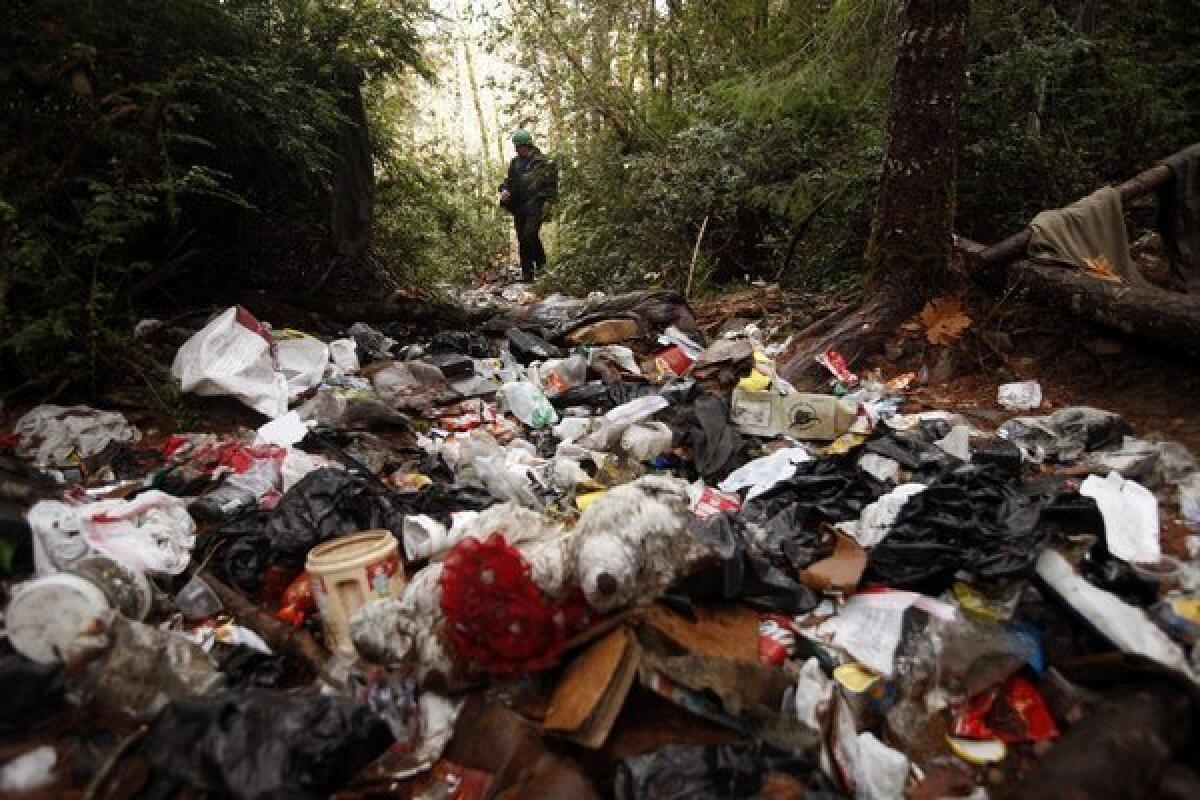Pot farms on federal land targeted for new penalties

WASHINGTON — Scientists have likened the illegal marijuana-growing operations in remote areas of the West to leaking chemical-weapons stockpiles, with the heavy use of fertilizers and pesticides posing risks to the environment, including to waterways and wildlife.
In response, Congress is moving to toughen the penalties for cultivating pot on federal land.
The Senate recently approved a measure that would add — on top of the sentence for illegally growing marijuana — up to 10 years in prison for those cultivating the drug on federal land. The measure, a little-noticed addition to the immigration overhaul bill, also calls for new penalties for environmental damage such as that caused by the use of toxic chemicals.
In a rare instance of bipartisanship, a similar measure has been introduced in the House by unlikely allies — freshman Reps. Jared Huffman (D-San Rafael), a San Francisco Bay-area liberal, and Doug LaMalfa (R-Richvale), a conservative Northern California farmer. Rep. Mike Thompson (D-St. Helena) is a cosponsor.
California, with its hospitable climate and vast stretches of remote land, had 1 million pot plants eradicated from federal land last year, by far the most in the nation, according to the Drug Enforcement Administration.
Angeles National Forest has ranked in the Top 10 national forests for illegal marijuana groves for the last three years, according to the U.S. Forest Service. Last year, Los Padres National Forest ranked first, followed by Sequoia and San Bernardino forests.
The legislative push follows a recent study that said pesticides used in marijuana-growing operations may be taking a toll on the fisher, a weasel-like mammal. The study found higher mortality rates for female fishers living near marijuana-growing sites in the Sierra.
“Very few people realize that the illegal marijuana gardens in the Western U.S. are not mom-and-pop efforts,” said Craig Thompson, the study’s lead author and a U.S. Forest Service wildlife ecologist at the Pacific Southwest Research Station. “But instead they are actually industrial-scale efforts by foreign nationals, using large quantities of toxins that are banned in the United States.”
During a raid last year of an illegal marijuana-growing operation in Sequoia National Forest, authorities found oak trees chopped down to make way for about 10,000 marijuana plants. They also found fertilizers and pesticides dispersed throughout the site, including a banned rat poison.
“These illegal chemicals are poisoning public lands, killing wildlife and endangering people who come in contact with them,” Benjamin B. Wagner, U.S. attorney for the Eastern District of California, said last fall after charging the suspects in that case.
Taxpayers often are left with the tab for cleaning up the marijuana-growing sites, officials said.
The tougher penalties were included in the immigration bill at the urging of Sen. Orrin G. Hatch (R-Utah), who says that Mexican drug traffickers use immigrants brought into the country illegally to cultivate and guard the pot farms.
The measure would direct the U.S. Sentencing Commission to draw up guidelines to increase the punishment for diverting water, using poison or other hazardous chemicals, possessing a weapon or setting a booby trap while cultivating marijuana on federal land.
Dan Riffle, director of federal policies for the Marijuana Policy Project, which promotes legalization, was skeptical that tougher penalties would help end environmental damage.
“In our view, the best way to end destruction of federal land by illicit marijuana grows is not through further criminalization, but through regulation,” he said. “The only permanent solution is taxing and regulating marijuana like alcohol. There’s a reason we don’t read headlines about Mexican cartels growing illicit fields of hops and barley in our national parks.”
While Huffman is cosponsoring separate legislation to decriminalize marijuana at the federal level and leave it to states to decide whether to allow marijuana for medicinal or recreational use, he says he sees no inconsistency in his support for cracking down on marijuana-growing operations that cause environmental damage.
“As we move toward more rational marijuana policies … it’s important that we address the immediate threat to our environment and public safety posed by trespass growing operations,” he said.
ALSO:
‘Whitey’ Bulger trial: Day 4 ends without a verdict
16 New Jersey garage workers have winning Powerball ticket
Florida murder suspect allegedly posts photo of dead wife on Facebook
Follow L.A. Times National on Twitter
More to Read
Sign up for Essential California
The most important California stories and recommendations in your inbox every morning.
You may occasionally receive promotional content from the Los Angeles Times.











